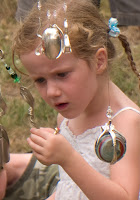The Networked Student by Wendy Drexler
In Mrs. Drexler's video she introduces the concept of Connectivism, which is the theory that knowledge is based off of social connections in the world as a whole and not only through one individual. I totally agree with this theory. We must venture out of our own personal worlds and into the real world, which mainly consists of interactions with other people. Although you may feel your ideas are enough and what you believe is good enough for you, it is not. If you don't take the opportunities to listen to others' opinions, you are stuck in the dark. In other words, you are ignorant. You are not helping yourself to stay ignorant, and you are certainly not helping anyone else. To hear others' reasoning behind matters and compare and contrast their reasoning with your own is the beginning of Connectivism.
However, I feel listening and absorbing different viewpoints is only the first step. In order to grow in your walk through life and change the world for the better, the application of newly learned information and skills must take place. There is really not a purpose for learning if you have no desire to do anything with what you are learning. It is also pointless to stop learning once you feel comfortable with what you have learned thus far. The world is constantly changing. It will not stop changing, and that means we can't either. We have to stay up to date on current technology and issues we are facing. We are all in it together and depend on each other everyday.
We as teachers should all believe in Connectivism because we are the ones who will send children into the world with the knowledge they need to continue growing. I see much too often that after high school many young people are just fine with being through with school. Where do they go from there? I know it would have been different if Connectivism had been instilled in every teacher's mind and used for the children's advantage. Unfortunately, this is something that only began to be applied to teaching very recently, along with technology. A student who learns about what it means to be a networked student will surely have his or her mind opened up, but a networked student with a teacher for guidance will go even farther.
Although in my particular career I will not be working with students that will have the ability to understand much of the things other students can understand, I see why it is so important to be led to the acceptance and acknowledgment of diversity. I believe that through Connectivism I can apply various ideas I have obtained to help my students understand better even something as natural to us as decision making and the outcome of particular decisions, even if they may not be able to understand the "why" behind it. Using others' professional experiences, I can try different methods and observe what works the best for each individual student, along with forming my own new opinions based on experiments.
A 7th Grader's Personal Learning Environment (or PLN)
I watched this video a while back, but it was more amazing to me this time than the first time. The second time's the charm I suppose. This 7th grade girl proves through her PLN that she is very motivated and diligent. Her demonstration of how she uses her PLN shows the endless possibilities Connectivism creates.
At a very young age she is already gathering information from many sources and sharing her own ideas. She is able to form her own opinions on different matters and receive feedback along with giving her own output on others' views. This will cause her to question her thoughts and the views of others her own age or those who are more experienced. I think this is an extremely healthy start for her growth in whatever career she chooses. Not only is she learning firsthand the numerous ways she can learn, but she is discovering how to apply them to best suit herself. Most importantly to me, she is learning how to have have fun learning. Learning shouldn't be "boring" or "stupid". Learning is meant to be fun, and this 7th grade girl has discovered that already. This speaks volumes of the possibilities that exist today in the hands of our children.
In comparison to my own PLN, I feel that this student has outdone me. I am disappointed in myself, but it just means I have to step up my pace and look more deeply into things I have skimmed through or overlooked completely in the past. I have found a few helpful blogs of special educators who have some positive output on their own experiences and specific techniques they have found to work well in their classes that I anticipate experiencing for myself.
The Machine is Changing Us
Dr. Wesch did a fantastic job summing up how drastically the machine (television and the internet) has changed our world. His speech really spoke deep to me. We are becoming more and more self-centered each day. We want to be noticed, we want to have a voice, and we want to be loved. However, because of MTV and other faulty television shows that influence our feelings, we have sadly allowed our cares for ourselves to become narcissistic. At times, it's hard to decide whether someone is putting on a front to look good or truly being sincere.
Despite this, I know that if we would all put our many fears aside, we could accomplish so much more. Instead of watching people on YouTube videos and distancing ourselves from face to face discussions and critique, we should be joining together to find a solution for the world and the peace and love we all hope for. Nothing will come out of putting pretty pictures with the word "peace" written on your hand on Facebook. In order to gain something we desire, we have to
work for it as has been proved to us since the beginning of time. It's also obvious that we can not save the world by ourselves. We have to join together. A multitude of creative minds working together creates one massive creative mind with so much potential it's almost impossible to imagine. However, we have to realize that nothing is impossible, and do what we have to do to get where we want. Most importantly, we have to try.
Honestly, I've always been a really shy person. It's just who I am. I can't let a little nervousness when speaking to new people hold me away from my passions to get out there and make a difference. I just spoke to myself in saying that we can not do it on our owns. I have to get over my fears and do everything I want to do, that I need to do. Overcoming fears is something we all have to face, and this is what Dr. Wesch's video said to me over everything else.
I know it will be worth it to help those sweet, innocent children who are in this big, scary world just like me. I want to help the needy in third world countries, whether it's simply giving money or actually traveling somewhere and making a difference in their lives. It would thrill me to put a smile on someone's face who I know has a really hard time in life, to teach them about God, and to give them a big meal, new clothes and shoes, and toys to play with. Another passion I have is foreign languages. I wish it were possible for me to speak every language there is. I am currently in Spanish 1 and I would love to learn Spanish, Arabic, and Mandarin. I know it will be a lot of work, but if I could travel and teach children in other countries, I wouldn't feel the least bit of remorse.
Now that I am in Mobile, a 200,000 population town compared to the 5,000 population town I grew up in, the opportunities are so much greater. It all comes down to searching the community I live in for ways to interact with other people in bettering the society we live in. The idea of recognition is exciting to me, and overcoming my shyness is the step I am taking in order to hear those other ideas from other people that are just like me. Since I recently cut back on my hours at my part time job at Raising Cane's Chicken Fingers, I plan on doing just that as soon as possible. Actually, I'm going to start searching now using the wonderful tool, Google.









































